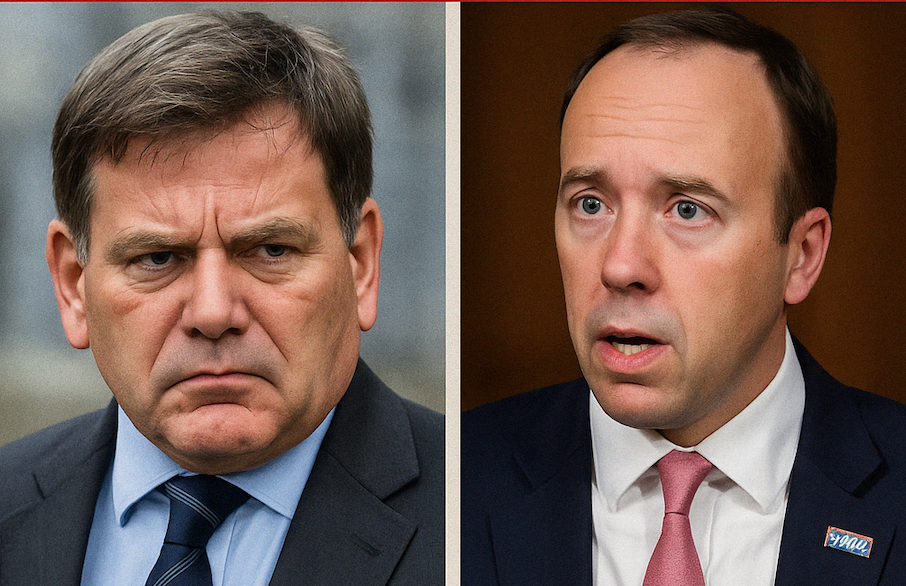Bridgen v Hancock: The Political Libel Bombshell Shaking Westminster to its Core!
Westminster is ablaze once again this time not from political infighting or policy failures, but from a courtroom drama so venomous, so scandalously personal, that it’s being dubbed "The Trial That Shamed Parliament." In the red corner: Andrew Bridgen. In the blue corner: Matt Hancock. And at the heart of it? One incendiary tweet, accusations of antisemitism, and reputations hanging by a thread.
On the chilly morning of January 11, 2023, Conservative MP Andrew Bridgen tweeted a now-notorious statement citing a cardiologist who claimed that COVID vaccines represented "the biggest crime against humanity since the Holocaust." Within hours, the backlash exploded like wildfire.
Then came the body blow.
Former Health Secretary Matt Hancock stood in the Commons and publicly eviscerated Bridgen, labeling the remarks as “disgusting, antisemitic, anti-vax conspiracy theories.” Minutes later, Hancock doubled down on Twitter with a tweet that would become the subject of this high-stakes libel case:
“The disgusting and dangerous anti-semitic, anti-vax, anti-scientific conspiracy theories spouted by a sitting MP this morning are unacceptable and have absolutely no place in our society.”
Bridgen was never named but everyone knew. And Hancock knew they knew.
What followed was pure political carnage. Bridgen had the Conservative whip removed that same day. His reputation was scorched in the national press. Constituents turned cold. And in 2024, he lost his seat.
But Bridgen wasn’t done. In May 2023, he sued Hancock for libel, accusing the ex-health minister of falsely branding him as antisemitic and destroying his political career.
Speaking through counsel, Bridgen argued: “I wanted justice before the general election. I was smeared. I was silenced. I was sacrificed to the altar of vaccine orthodoxy.”
Hancock’s tweet is still live still racking up views, now over . Bridgen claims every extra click deepens the wound.
“The allegation of antisemitism is political acid,” a media ethics expert told us. “Once it’s poured, you can’t wash it off. And in this case, it was poured in gallons.”
Bridgen’s legal team cites widespread recognition of the tweet’s target. They argue the innuendo was obvious Bridgen’s earlier post was trending, PMQs had just happened, and the Chief Whip publicly denounced him by name.
“Everyone knew,” Bridgen’s lawyer thundered in court. “You didn’t need Sherlock Holmes to figure it out. Hancock pointed the mob. The mob turned.”
Here’s where it gets murky. Hancock argues his tweet was , not fact a critical distinction under the Defamation Act 2013. If the court agrees, Bridgen’s case could collapse like a house of cards.
But Bridgen isn’t backing down. His team claims Hancock didn’t believe the tweet. Instead, they accuse Hancock of “weaponising antisemitism” to shut down debate on vaccine ethics.
In a dramatic twist, the court heard that penned a letter defending Bridgen, stating and .
One Jewish doctor reportedly wrote, “We saw authoritarianism during the pandemic. To compare it to the Holocaust was hyperbolic but not antisemitic. To call it that is cynical and dangerous.”
On April 14, 2025, in a bombshell ruling, Mrs Justice Collins Rice rejected Hancock’s attempt to shut the case down early. Despite attempts to argue there was “no serious harm” or that Hancock’s opinion was protected, the judge ruled that:
“It is not unreal to seek to establish that Mr Hancock’s tweet changed minds, set the narrative, and caused reputational damage of a serious nature.”
Translation? This isn’t over. Not by a long shot.
Bridgen claims the tweet and the firestorm it unleashed led directly to his crushing 2024 election loss.
“I had voters tell me, ‘I liked you, but I don’t vote for antisemites,’” he told supporters. “Matt Hancock cost me my reputation and my career. He knew exactly what he was doing.”
And he's now demanding justice in the form of damages—and, many believe, vindication.
A spokesperson for Matt Hancock was unapologetic: “Mr Hancock stands by the importance of defending public health and condemning outrageous comparisons between a life-saving vaccine rollout and the Holocaust. He will vigorously defend his right to do so.”
Behind closed doors, though, insiders hint Hancock was stunned by the judge’s refusal to dismiss the case.
“He thought it would be shut down in a snap,” a source close to Hancock said. “Now he’s looking at a full trial, reputational risk, and cross-examination under oath.”
This isn’t just about two politicians. It’s about the boundaries of speech, the weaponisation of outrage, and whether our democracy still has space for uncomfortable questions without character assassination.
It’s about whether calling someone an antisemite without naming them, but making it obvious, is still defamatory.
And it’s about how social media, once a tool for connection, has become a digital guillotine.
Legal analysts say the saga could set a powerful precedent. If Bridgen wins, politicians may need to think twice before firing off tweets of condemnation. If he loses, the door is open for even more aggressive “call-out culture” from the Commons to cyberspace.
One barrister summed it up: “This is about the soul of political discourse in Britain. And it’s going to get bloodier before it’s over.”



